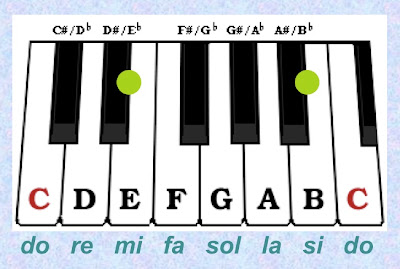As the above explanation sounds like technobabble, for the benefit of those students who have no knowledge of Western music theory, I usually describe the neutral third as
the interval, or simply distance, between do and the mysterious tone which is located between the black mi and the white mi.I also prepare on the PowerPoint slide a wee diagram of the piano keyboard and three sound clips so that students can 'see' and 'hear' clearly what I refer to.

This clip plays do-re-mi-fa-sol with mi on the white key.
This clip plays do-re-mi-fa-sol with mi on the black key.
This clip plays do-re-mi-fa-sol with mi, something between black and white keys that can't be produced on the Western piano.
The interval between do on the white key and this mysterious mi is the so-called neutral third. In music of the Arab world, one can also hear another similar tone between the black si and the white si, and thus the scale below.

This clip plays do-re-mi-fa-sol-la-si-do with the mysterious mi and si.
So, dear readers, do you recognise the sound characteristic of the neutral third?




